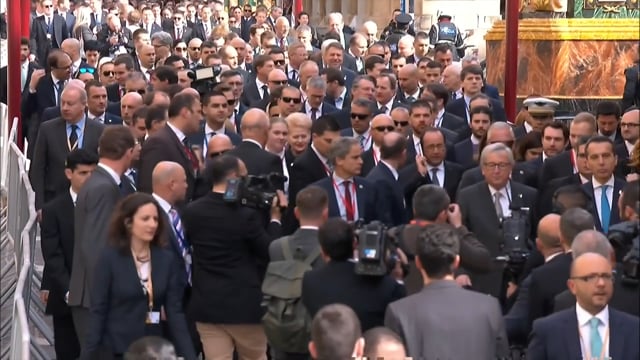[WATCH] 'Level-headed' migration plan is first phase before opening humanitarian corridors
‘We are not supporting an agreement without knowing the pitfalls… but this is an unprecedented step’ – Joseph Muscat on Libya migration plan


Prime Minister Joseph Muscat has described a migration plan to stem the flow of migrants from Libya to Europe as “level-headed”.
This morning, the 28 EU leaders agreed to roll out a €200 million migration plan whereby the EU would support Libya in controlling its borders, provide training and assistance in refugee camps where dire conditions have sparked concerns among human rights organisations.
The EU claims that its actions will reduce migratory flows and break the business model of smugglers, by working with Libya as the main country of departure.
The plan includes training and support to the Libyan national coats guard for the interception of migrant boats, in collaboration with the EU’s Operation Sophia.
“I think that this is the first time that the EU leaders reached a consensus without delaying the meeting… it’s an important progress which shows our unity.
“It also shows that we can tackle migration from a level-headed point of view. It’s not a black and white issue but there can be sensible ways how we can move ahead.”
But Libya is far from being a stable country and the UN-backed Government of National Accord (GNA) doesn’t hold effective control over all factions.
“There is no silver bullet so it’s not a question that with one decision you solve everything,” he said, referring to the Libya agreement signed with Italy. “The Libyan authorities are asking for assistance in monitoring their borders and in managing their camps where refugees and migrants are kept.”
There is going to be direct engagement with the tribes in the south of Libya, Muscat said, who during the peak season of migration can rake in between €5 million to €6 million per week working with criminals.
“Only time will tell if this can be enough,” he added.
The Maltese Prime Minister said the Libyan government has acknowledged that it needed to strengthen national dialogue, including with the General of the Libyan National Army, Khalifa Haftar.
“We are not supporting an agreement without knowing the pitfalls. But this is a step, an unprecedented first step.”
Muscat said that, only today, 12 smuggling boats left the coast of Libya with asylum seekers; two days ago, 1,400 people were rescued by the Italian navy.
“The next phase is to create humanitarian corridors to making it possible for people to come to Europe without crossing one of the most dangerous seas in the world.”
Addressing a joint press conference with European Council President Donald Tusk and European Commission President Jean-Claude Juncker, Muscat reiterated that the Libyan situation “was not an excuse not to engage”.
“To the contrary, it means we need to do more.”
EU’s worse threat: Trump or Putin?
The trio was reluctant to express their opinion on who was worse for the European Union between US President Donald Trump and Russia President Vladimir Putin.
During the working lunch, the EU28 discussed the US administration, which Tusk had earlier described as an “external threat” to the bloc.
“There was concern amongst the EU28 on some decisions taken by the new administration and on some attitudes being adopted… but there was no sense of anti-Americanism.”
Muscat said that the EU needed to engage with the US, whilst showing that they would not remain silent where principles are being trampled on.
But when asked a pointed question and who was the worse threat for the EU, Muscat and Tusk opted for a diplomatic reply… whilst Juncker jokingly raised a finger to say “me”.
“The biggest threat is if we don’t acknowledge that we’re living in historic times and that we need to get out act together.”
Expressing the same sentiment, Tusk said the EU leaders needed to unite to address the challenges facing the EU: “It can become a real threat if we don’t stand united.”






.jpg)












.jpeg)



